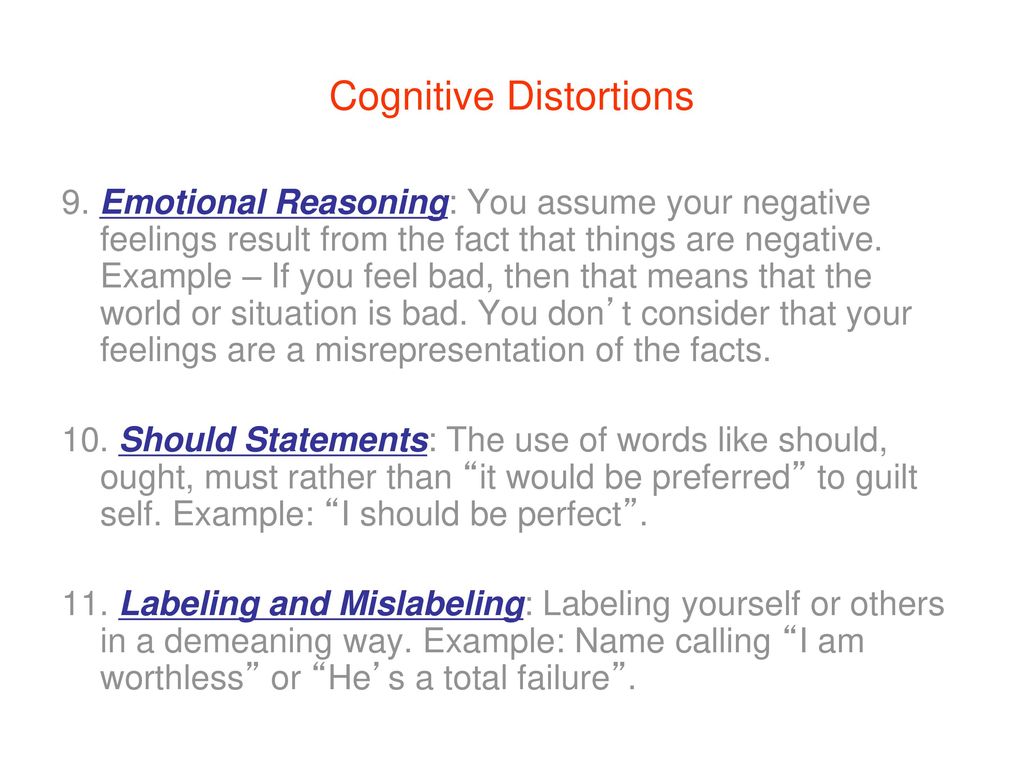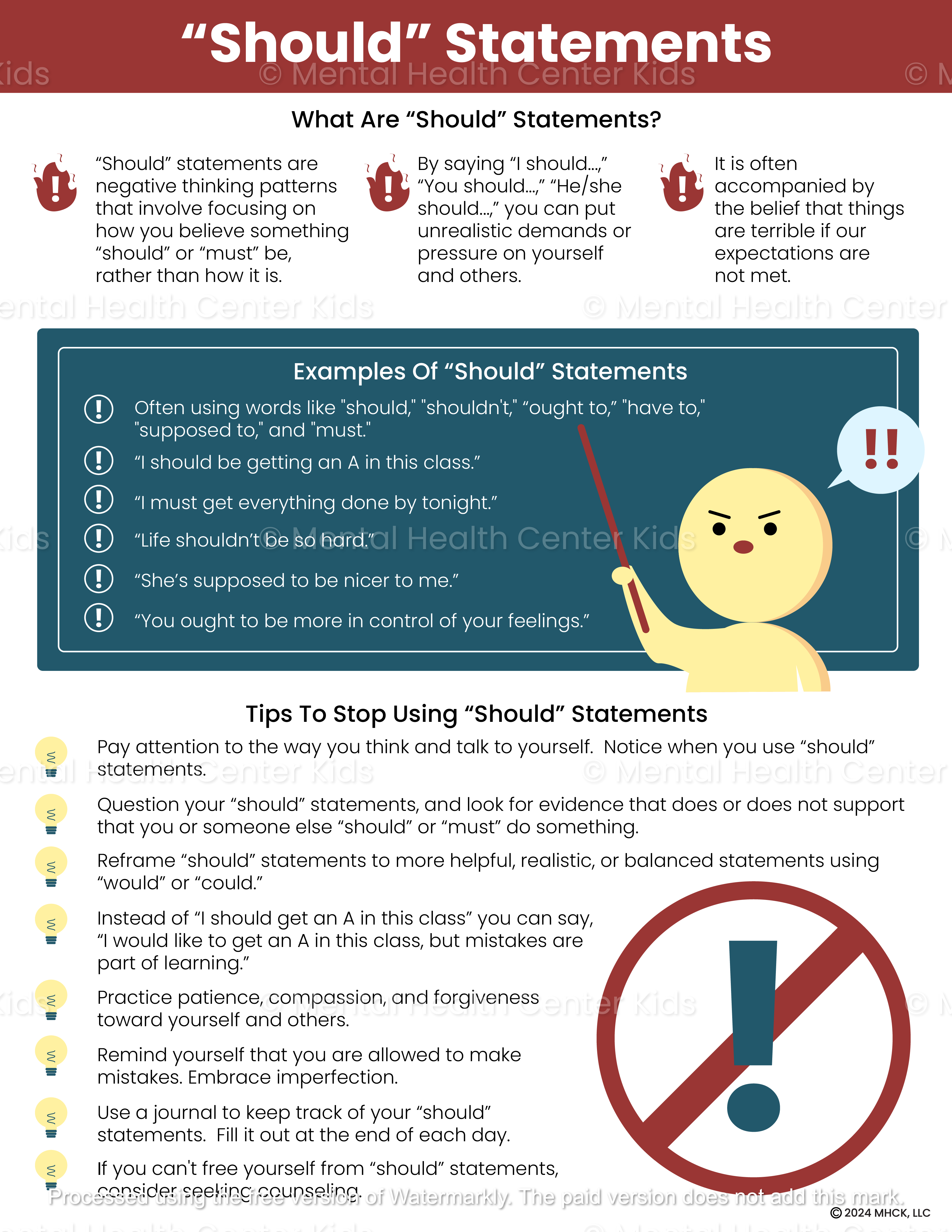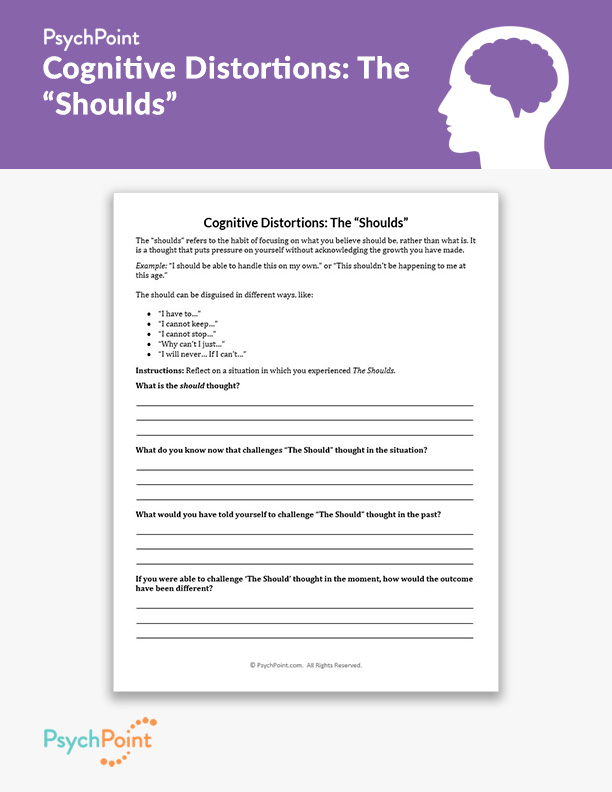Should Statements Cognitive Distortion
Should Statements Cognitive Distortion - In cognitive behavioral therapy, these kinds of should statements are called cognitive distortions. A “should statement” is a type of negative thinking pattern that can cause feelings of doubt and fear in a person. Should statements fall into the classification of cognitive distortions. They are automatically biased negative thoughts that influence and. This is a fancy way of. Should statements are a common cognitive distortion that can significantly impact our thoughts and emotions. “should statements” are a cognitive distortion commonly associated with negative thinking patterns and can be indicative of various.
Should statements fall into the classification of cognitive distortions. A “should statement” is a type of negative thinking pattern that can cause feelings of doubt and fear in a person. This is a fancy way of. In cognitive behavioral therapy, these kinds of should statements are called cognitive distortions. Should statements are a common cognitive distortion that can significantly impact our thoughts and emotions. “should statements” are a cognitive distortion commonly associated with negative thinking patterns and can be indicative of various. They are automatically biased negative thoughts that influence and.
They are automatically biased negative thoughts that influence and. A “should statement” is a type of negative thinking pattern that can cause feelings of doubt and fear in a person. “should statements” are a cognitive distortion commonly associated with negative thinking patterns and can be indicative of various. In cognitive behavioral therapy, these kinds of should statements are called cognitive distortions. Should statements are a common cognitive distortion that can significantly impact our thoughts and emotions. This is a fancy way of. Should statements fall into the classification of cognitive distortions.
50 common cognitive distortions
Should statements are a common cognitive distortion that can significantly impact our thoughts and emotions. In cognitive behavioral therapy, these kinds of should statements are called cognitive distortions. A “should statement” is a type of negative thinking pattern that can cause feelings of doubt and fear in a person. This is a fancy way of. Should statements fall into the.
"Should" Statements Cognitive Distortion (PDF) Mental Health Center Kids
This is a fancy way of. Should statements are a common cognitive distortion that can significantly impact our thoughts and emotions. In cognitive behavioral therapy, these kinds of should statements are called cognitive distortions. A “should statement” is a type of negative thinking pattern that can cause feelings of doubt and fear in a person. Should statements fall into the.
"Should" Statements Cognitive Distortion (PDF) Mental Health Center Kids
A “should statement” is a type of negative thinking pattern that can cause feelings of doubt and fear in a person. “should statements” are a cognitive distortion commonly associated with negative thinking patterns and can be indicative of various. This is a fancy way of. Should statements fall into the classification of cognitive distortions. Should statements are a common cognitive.
Cognitive Distortions Holy Trinity Catholic High School Temple, TX
“should statements” are a cognitive distortion commonly associated with negative thinking patterns and can be indicative of various. A “should statement” is a type of negative thinking pattern that can cause feelings of doubt and fear in a person. They are automatically biased negative thoughts that influence and. This is a fancy way of. In cognitive behavioral therapy, these kinds.
Cognitive Distortions Should Statements YouTube
Should statements are a common cognitive distortion that can significantly impact our thoughts and emotions. They are automatically biased negative thoughts that influence and. A “should statement” is a type of negative thinking pattern that can cause feelings of doubt and fear in a person. This is a fancy way of. “should statements” are a cognitive distortion commonly associated with.
What Are “Should” Statements? Assertiveness Basics PSYCHOLOGY CORNER
Should statements fall into the classification of cognitive distortions. In cognitive behavioral therapy, these kinds of should statements are called cognitive distortions. Should statements are a common cognitive distortion that can significantly impact our thoughts and emotions. A “should statement” is a type of negative thinking pattern that can cause feelings of doubt and fear in a person. “should statements”.
Understanding your Cognitive Distortions Nandita Bhaskhar
Should statements are a common cognitive distortion that can significantly impact our thoughts and emotions. “should statements” are a cognitive distortion commonly associated with negative thinking patterns and can be indicative of various. Should statements fall into the classification of cognitive distortions. A “should statement” is a type of negative thinking pattern that can cause feelings of doubt and fear.
35 Cognitive Distortion Examples (2024)
This is a fancy way of. They are automatically biased negative thoughts that influence and. Should statements fall into the classification of cognitive distortions. Should statements are a common cognitive distortion that can significantly impact our thoughts and emotions. A “should statement” is a type of negative thinking pattern that can cause feelings of doubt and fear in a person.
Cognitive Distortions Should Statements YouTube
A “should statement” is a type of negative thinking pattern that can cause feelings of doubt and fear in a person. Should statements fall into the classification of cognitive distortions. Should statements are a common cognitive distortion that can significantly impact our thoughts and emotions. In cognitive behavioral therapy, these kinds of should statements are called cognitive distortions. This is.
Cognitive Distortions The “Shoulds” Worksheet PsychPoint
Should statements fall into the classification of cognitive distortions. They are automatically biased negative thoughts that influence and. Should statements are a common cognitive distortion that can significantly impact our thoughts and emotions. “should statements” are a cognitive distortion commonly associated with negative thinking patterns and can be indicative of various. In cognitive behavioral therapy, these kinds of should statements.
“Should Statements” Are A Cognitive Distortion Commonly Associated With Negative Thinking Patterns And Can Be Indicative Of Various.
They are automatically biased negative thoughts that influence and. Should statements are a common cognitive distortion that can significantly impact our thoughts and emotions. A “should statement” is a type of negative thinking pattern that can cause feelings of doubt and fear in a person. This is a fancy way of.
Should Statements Fall Into The Classification Of Cognitive Distortions.
In cognitive behavioral therapy, these kinds of should statements are called cognitive distortions.









